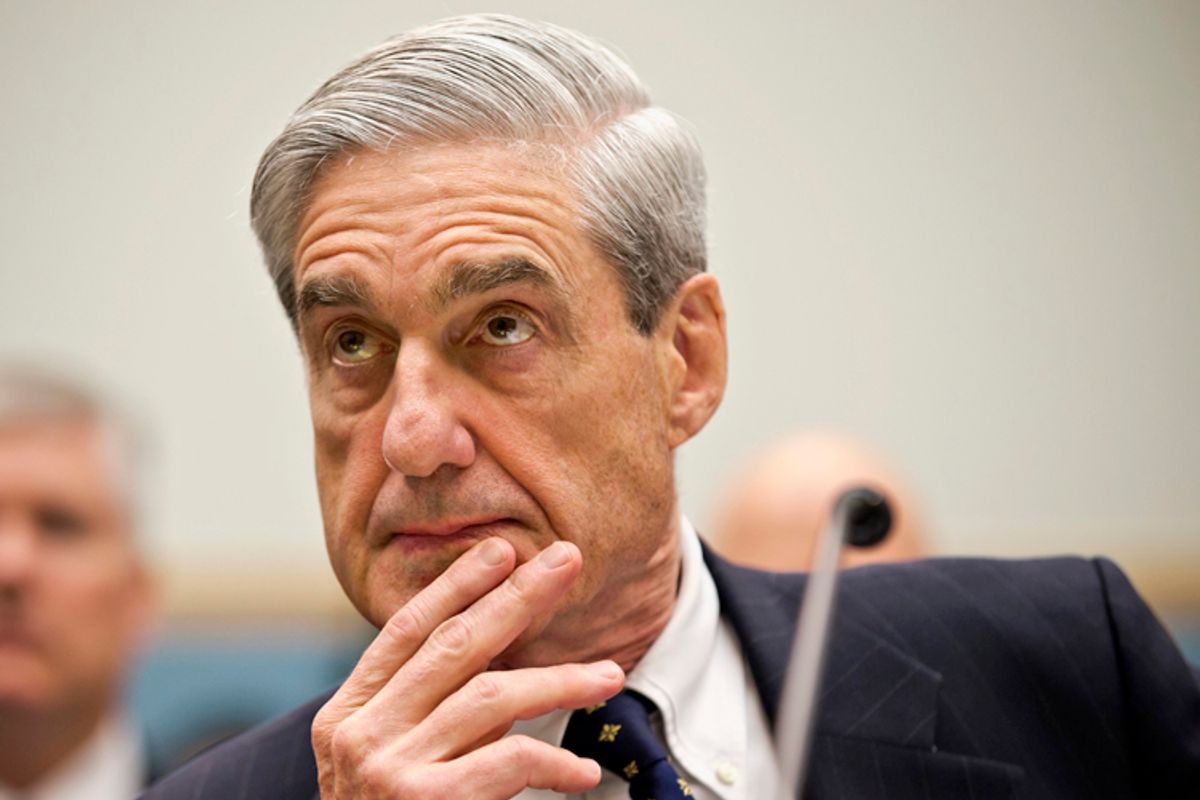Special Prosecutor Robert Mueller and his team have big advantage in the Washington debate about the story of the Trump campaign and the Russian government: a wellspring of new evidence gathered by the FBI and the NSA, with warrants approved by the federal courts.
Mueller & Co, can leak selected tidbits to shape the story of their investigation, and they do.
Mainstream media news organizations cultivate this relationship. Aggressive reporting, artfully assisted by leaks from Mueller’s lieutenants, are driving the story of the apparent collusion between the Trump campaign and the Russian government in the 2016 election.
1) The Perpetrators
Indictments are coming, says Sen. Richard Blumenthal, D-Conn. A former federal prosecutor, Blumen that told Politico this week he was “99 percent”sure that Mueller would file charges against former Trump campaign manager Paul Manafort and short-lived national security adviser Michael Flynn.
Blumenthal’s assessment was based on details of the FBI raid on Manafort’s northern Virginia home in late July. To obtain the search warrant, the FBI agents had to present evidence to judge that that Manafort had lied and destroyed evidence and might do so again. They got the warrant.
Last week two of Flynn’s siblings announced that they had formed a legal-defense fund for their brother whose lawyers’ fees are already “well into the seven figures,” his brother Joe told Fox News on Monday.
Flynn's probelms are mounting. In March, he registered with the government as a foreign agent, a tacit concession that he had violated the Foreign Agents Registration Act. Even Trump apologist Alan Dershowitz has predicted that Flynn will “probably be indicted”
2) The Crimes:
Mueller has let it be known that he is pursuing charges of obstruction of justice, money laundering, making false statements, and possibly even treason.
On September 20 the Times reported Mueller is seeking documentation about a meeting Trump had in May with Russian officials in the Oval Office the day after he fired FBI director James Comey. Trump met with the Russian foreign minister, Sergey V. Lavrov, and the Russian ambassador to the United States at the time, Sergey I. Kislyak, along with other Russian officials. In the meeting Mr. Trump had said that firing Mr. Comey relieved “great pressure.”
Manafort was one Trump’s original conduits to the Russians. His name turned up in financial ledgers of Ukrainian president and oligarch Victor Yanukovych for whom he served as a political consultant in 2010. The ledgers (whose authenticity Manafort has disputed) identified 22 payments adding up to $12 million.
As NBC News reported in May, federal officials say that the money Manafort earned from both the party and the oligarchs — and what he did with it — are drawing the attention of investigators. In particular, Manafort advised a Ukrainian political party accused of threatening US Marines and spoiling an international military exercise in 2011.
This raises the possibility of charges of treason or violation of the Logan Act, forbidding U.S. citizens from negotiating with foreign governments that have a dispute with the U.S. government.
3) The Motive
Why did Trump’s people do what they do?
Last week, the Washington Post provided a possible answer: Manafort wanted to get a Russian oligarch off his back and Putin helped him.
“Less than two weeks before Donald Trump accepted the Republican presidential nomination, his campaign chairman [Manafor] offered to provide briefings on the race to a Russian billionaire closely aligned with the Kremlin,” the Post reported.
That was oligarch Oleg Deripaska. In another e-mail, the Post reported, Manafort seemed to suggest that he could leverage his new role running Trump’s campaign to settle his multimillion dollars debts with Deripaska
Putin clearly wanted access to Trump and wanted to help him. The emails released in June by Don Trump Jr. show that a Putin emissary informed Manafort and son-in-law Jared Kushner about "the Russian government’s support for your campaign.”
4) The Means
What was the nature of the Russian support?
The short answer, it is now clear, is secret assistance in the social media space.
Back in July McClatchy News reported Mueller’s investigators “are focusing on whether Trump’s campaign pointed Russian cyber operatives to certain voting jurisdictions in key states – areas where Trump’s digital team and Republican operatives were spotting unexpected weakness in voter support for Hillary Clinton.”
The Trump campaign's digital operations were overseen by Kushner.
Now corroborating details are emerging. Facebook disclosed that Russian entitites had bought more than 3,000 politically charged ads estimated at $150,000 on its platform during key periods of the presidential campaign. Facebook also linked the ads to a controversial Russian entity known as the Internet Research Agency.
While $150,000 is a pittance in a U.S. presidential campaign, a pittance in social media fabrication can yield an enormous political payoff. One fake news story, concocted by a Trump supporter with no Russian connections, reached 6 million people.It cost exactly $5 to produce.
So the Trump campaign gained a blitz of untraceable digital attack ads targeted at motivating Trump voters and discouraging Democratic turnout in key swing states ignored by Hillary Clinton.
One Russian account, reports the Daily Beast
pushed memes that claimed Hillary Clinton admitted the U.S. “created, funded and armed” al-Qaeda and the so-called Islamic State; claimed that John McCain was ISIS’s true founder; whitewashed blood-drenched dictator Moammar Gadhafi and praised him for not having a “Rothschild-owned central bank”; and falsely alleged Osama bin Laden was a “CIA agent.”
The targeted ads sought to disarms Democrats. Bernie Sanders supporters were encouraged to vote for Jill Stein. Clinton supporters were discouraged from turning out And so on
Whether this digital blitz had impact remains to be seen. But for now, we know the key elements of Mueller's investigation: the perps, the crimes, the motive and the means.
And there is more to come.




Shares